According to the documenta, the Indonesian curatorial collective Ruangrupa underestimated the importance of the Kassel art show for the German public. “In Indonesia nobody cares much about us. The documenta, on the other hand, is almost an affair of state. This magnitude should have been clear to us earlier," Ruangrupa members Reza Afisina and Farid Rakun told the Berlin "Tagesspiegel" (Monday).
“For us, the first allegations of anti-Semitism came unexpectedly in January. We never thought it would escalate like this," the two explained in the interview. When politics and the media got involved, "a new dynamic" emerged. "We learned from this that we have to explain better what we're doing." Several works were criticized as anti-Jewish.
There are also cultural misunderstandings, Afisina and Rakun said. In Indonesia, there has long been a lack of access to information from outside. "Some call us naive, ignorant or insensitive, but we have to work through our own trauma," said Afisina. One is constantly learning that this should be the "quality" of documenta fifteen, "that it is not a closed exhibition, but that something can still change everywhere".
Works by the artist group Taring Padi were among the exhibits rated as anti-Semitic at the documenta.
"When the allegations came up, we didn't understand why no one spoke to us directly, why there was no dialogue," Afisina said. "In Indonesia, unlike in Germany, there is still no proper vocabulary for articulating what an anti-Semitic motive is." And: "It was only through the debate that we understood how sensitive the topic of anti-Semitism is in Germany."
Afisina explained why the collective only commented on the allegations of anti-Semitism quite late: "After the first incident with Taring Padi, we initially had talks. We just don't understand that it's not enough here if we publicly admit this mistake and especially apologize to the people in Kassel with whom we feel connected. With us, a mistake is named, you classify it and then continue. Nobody really listens here, although we're talking about dialogue – that's the theme of documenta fifteen. There is no desire at all to understand each other.”
Regarding the anti-Israel boycott movement BDS, Farid Rakun said that Ruangrupa had "various attitudes towards BDS as well as towards Indonesian politics". “I myself would only boycott if there were no other way. I'm not a fan of this strategy, but I understand that BDS is a possible method of protesting peacefully but audibly."
The collective is "not a uniform monolith," Rakun emphasized. "That's why we, as artistic directors, don't ask the invited artists about their political, religious or other affiliations beforehand. Participation in the documenta is based on shared values such as independence, transparency, frugality, sustainability.
When asked whether the collective would curate another major exhibition, Afisina said they missed not being able to participate artistically themselves in Kassel, since they are actually all artists themselves. "Nevertheless, we have a good time." Afisina also said - according to the "Tagesspiegel" with a laugh: "We would like to take part in the next documenta."

 B:SM will break its investment record this year with 62 million euros
B:SM will break its investment record this year with 62 million euros War in Ukraine: when kyiv attacks Russia with inflatable balloons loaded with explosives
War in Ukraine: when kyiv attacks Russia with inflatable balloons loaded with explosives United States: divided on the question of presidential immunity, the Supreme Court offers respite to Trump
United States: divided on the question of presidential immunity, the Supreme Court offers respite to Trump Maurizio Molinari: “the Scurati affair, a European injury”
Maurizio Molinari: “the Scurati affair, a European injury” Irritable bowel syndrome: the effectiveness of low-carbohydrate diets is confirmed
Irritable bowel syndrome: the effectiveness of low-carbohydrate diets is confirmed Beware of the three main sources of poisoning in children
Beware of the three main sources of poisoning in children First three cases of “native” cholera confirmed in Mayotte
First three cases of “native” cholera confirmed in Mayotte Meningitis: compulsory vaccination for babies will be extended in 2025
Meningitis: compulsory vaccination for babies will be extended in 2025 When traveling abroad, money is a source of stress for seven out of ten French people
When traveling abroad, money is a source of stress for seven out of ten French people Elon Musk arrives in China to negotiate data transfer and deployment of Tesla autopilot
Elon Musk arrives in China to negotiate data transfer and deployment of Tesla autopilot Patrick Pouyanné, CEO of TotalEnergies, is very reserved about the rapid growth of green hydrogen
Patrick Pouyanné, CEO of TotalEnergies, is very reserved about the rapid growth of green hydrogen In the United States, a Boeing 767 loses its emergency slide shortly after takeoff
In the United States, a Boeing 767 loses its emergency slide shortly after takeoff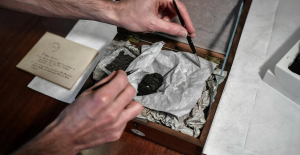 A charred papyrus from Herculaneum reveals its secrets about Plato
A charred papyrus from Herculaneum reveals its secrets about Plato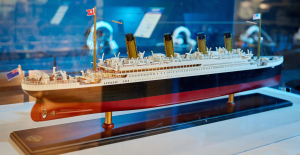 The watch of the richest passenger on the Titanic sold for 1.175 million pounds at auction
The watch of the richest passenger on the Titanic sold for 1.175 million pounds at auction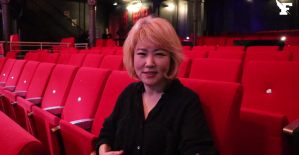 Youn Sun Nah: jazz with nuance and delicacy
Youn Sun Nah: jazz with nuance and delicacy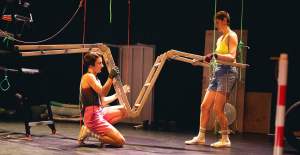 Paris Globe, a new international theater festival
Paris Globe, a new international theater festival Skoda Kodiaq 2024: a 'beast' plug-in hybrid SUV
Skoda Kodiaq 2024: a 'beast' plug-in hybrid SUV Tesla launches a new Model Y with 600 km of autonomy at a "more accessible price"
Tesla launches a new Model Y with 600 km of autonomy at a "more accessible price" The 10 best-selling cars in March 2024 in Spain: sales fall due to Easter
The 10 best-selling cars in March 2024 in Spain: sales fall due to Easter A private jet company buys more than 100 flying cars
A private jet company buys more than 100 flying cars This is how housing prices have changed in Spain in the last decade
This is how housing prices have changed in Spain in the last decade The home mortgage firm drops 10% in January and interest soars to 3.46%
The home mortgage firm drops 10% in January and interest soars to 3.46% The jewel of the Rocío de Nagüeles urbanization: a dream villa in Marbella
The jewel of the Rocío de Nagüeles urbanization: a dream villa in Marbella Rental prices grow by 7.3% in February: where does it go up and where does it go down?
Rental prices grow by 7.3% in February: where does it go up and where does it go down? Even on a mission for NATO, the Charles-de-Gaulle remains under French control, Lecornu responds to Mélenchon
Even on a mission for NATO, the Charles-de-Gaulle remains under French control, Lecornu responds to Mélenchon “Deadly Europe”, “economic decline”, immigration… What to remember from Emmanuel Macron’s speech at the Sorbonne
“Deadly Europe”, “economic decline”, immigration… What to remember from Emmanuel Macron’s speech at the Sorbonne Sale of Biogaran: The Republicans write to Emmanuel Macron
Sale of Biogaran: The Republicans write to Emmanuel Macron Europeans: “All those who claim that we don’t need Europe are liars”, criticizes Bayrou
Europeans: “All those who claim that we don’t need Europe are liars”, criticizes Bayrou These French cities that will boycott the World Cup in Qatar
These French cities that will boycott the World Cup in Qatar MLS: new double for Messi who offers victory to Miami
MLS: new double for Messi who offers victory to Miami PSG-Le Havre: Ramos on his way, Kolo Muani at the bottom of the hole… Favorites and scratches
PSG-Le Havre: Ramos on his way, Kolo Muani at the bottom of the hole… Favorites and scratches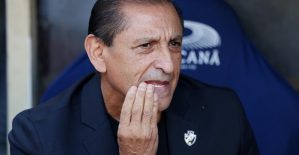 Football: Vasco da Gama separates from its Argentinian coach Ramon Diaz
Football: Vasco da Gama separates from its Argentinian coach Ramon Diaz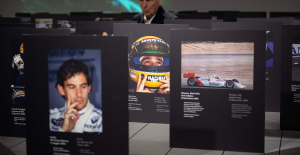 F1: for the French, Ayrton Senna is the 2nd best driver in history ahead of Prost
F1: for the French, Ayrton Senna is the 2nd best driver in history ahead of Prost

















